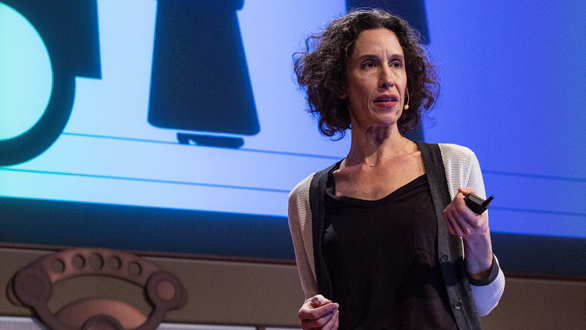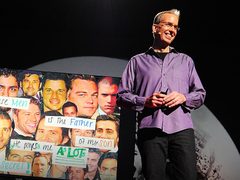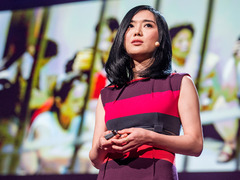 In today’s talk, Intel engineer Maria Bezaitis brings up a fascinating point: why is the phrase “don’t talk to strangers” such a part of our cultural zeitgeist?
In today’s talk, Intel engineer Maria Bezaitis brings up a fascinating point: why is the phrase “don’t talk to strangers” such a part of our cultural zeitgeist?
 Maria Bezaitis: Why we need strangeness
“When we’re at our best, we reach out to people who are not like us because when we do that, we learn,” says Bezaitis, in this talk given at TED@Intel. “In today’s digital world, strangers are quite frankly not the point. The point we should be worried about is how much strangeness are we getting?”
Maria Bezaitis: Why we need strangeness
“When we’re at our best, we reach out to people who are not like us because when we do that, we learn,” says Bezaitis, in this talk given at TED@Intel. “In today’s digital world, strangers are quite frankly not the point. The point we should be worried about is how much strangeness are we getting?”
To hear what she means by this, watch the talk. And below, check out more talks on the great things that can happen when we talk to people we don’t already know.
 Hannah Brencher: Love letters to strangers
Hannah Brencher: Love letters to strangers
Hannah Brencher: Love letters to strangers
Hannah Brencher: Love letters to strangersHannah Brencher doesn’t just start casual chats with strangers – she writes them intimate, handwritten letters. In this talk from the TED@NewYork salon, Brencher explains how she lifted herself out of her post-college depression by leaving letters for strangers to find – and how this grew into a worldwide initiative intended to give anyone who needs it a boost. |
 Frank Warren: Half a million secrets
Frank Warren: Half a million secrets
Frank Warren: Half a million secrets
Frank Warren: Half a million secretsPostSecret.com is a place that uses the anonymity of the internet to allow strangers to tell each other their deepest secrets — the things they would never dare to tell loved ones. In this talk from TED2012, Frank Warren shares how he developed this site, and reveals just a few of the half-million therapeutic secrets that have been sent to him. |
 Robin Chase: Excuse me, may I rent your car?
Robin Chase: Excuse me, may I rent your car?
Robin Chase: Excuse me, may I rent your car?
Robin Chase: Excuse me, may I rent your car?Sure, you might give directions to a stranger if they ask you on the street. But would you loan them your car? In this talk from TEDGlobal 2012, Robin Chase of Zipcar outlines her latest idea – Buzzcar, a French startup that lets people rent their cars to others, including people they don’t know, in a protected, good-for-all-involved way. |
 Rachel Botsman: The case for collaborative consumption
Rachel Botsman: The case for collaborative consumption
Rachel Botsman: The case for collaborative consumption
Rachel Botsman: The case for collaborative consumptionHuman beings are wired to share. And a new slate of online businesses are providing avenues to match “Person A’s haves with Person C’s wants,” says Rachel Botsman. In this talk from TEDxSydney, she shares the underpinnings of this new economy that depends on a wide network of strangers cooperating. |
 Jane McGonigal: Gaming can make a better world
Jane McGonigal: Gaming can make a better world
Jane McGonigal: Gaming can make a better world
Jane McGonigal: Gaming can make a better worldStrangers gather to play online games like World of Warcraft for a total of three billion hours a week. In this talk from TED2010, game designer Jane McGonigal shows how that collaborative power could be used to tackle real-world problems like poverty, climate change and obesity. (Here, read about 10 online games with a social purpose.) |
 Hyeonseo Lee: My escape from North Korea
Hyeonseo Lee: My escape from North Korea
Hyeonseo Lee: My escape from North Korea
Hyeonseo Lee: My escape from North KoreaIn this powerful talk from TED2013, Hyeonseo Lee explains how a stranger helped her bail her family out of jail as she helped them escape from North Korea. She says, “The kind stranger symbolized new hope for me — and for the North Korean people when we needed it most.” |
Bonus: In the TED Book, How Did You End Up Here?: The Surprising Ways Our Questions Connect Us, Davy Rothbart compiles 100 brilliant questions to help you break the ice with strangers. In this interview with the TED Blog about the book, the creator of Found magazine answers the question, “What do you think we gain from posing questions to people we don’t know?”
Comments (11)
Pingback: Sugar Bowl: Week of 5/18/13 | Discharmed
Pingback: “The Surprising Need for Strangeness” | The World in My Backyard
Pingback: First Post for Stranger | callmewierd